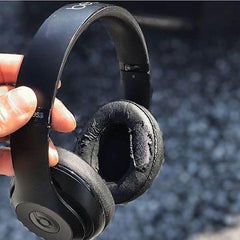Are AirPods Bad for your Ears and Brain?

Sit on public transport for long enough, people-watch from a street café or click through a handful of YouTube videos, and you’re sure to recognise these small signature white speakers quite literally hanging from people’s ears.
Apple AirPods account for around 60% of the global wireless earbud market.
But despite their popularity, they’re not without some controversy.
Some researchers and scientists have suggested that Apple’s big seller could be dangerous.
But are AirPods bad for your ears and brain? Or is it just scaremongering?
Are Airpods Bad for your Ears?
AirPods can definitely be bad for your ears but it’s the same problem with almost any type of earbud: people are more likely to turn up the volume on in-earphones and this can lead to permanent hearing damage.
It’s not a problem specific to AirPods, but they sit outside the ear canal and that means they have poor noise isolation.
If you’re having trouble hearing the audio you’re playing, your reaction will be to dial the volume up. As Angela Lashbrook writes on Medium, AirPods do a poor job of ‘overpowering noise like chattering colleagues or teens on the subway’.
AirPods Pro have noise-cancellation, and this offsets some of the incoming soundwaves and helps keep the volume lower, but noise-cancelling in general isn’t always effective at reducing loud voices: shrill conversations or babies crying, for example.
Whilst on-ear and over-ear headphones offer an additional buffer to noise thanks to their cushions, AirPods don’t.
The reality is that AirPods can be bad for your ears. The design does little to encourage safe listening in noisy environments but Apple may argue that it’s up to the responsibility of the listener.
And is it fair to single them out when you could also pick up any other brand and say the same thing?
But even though other earbuds may be just as poor at noise-isolation, AirPods have 60% of the market share.
If you’ve recently bought a pair of AirPods, you should bear in mind that an iPhone can reach up to 100 decibels and hearing damage can start to occur at around 85 decibels. This is worrying precisely because AirPods are poor noise isolators; sitting so close to the ear canal, they can also ‘elevate sound by up to 9 decibels’.
If you’re willing to listen to your AirPods at a safe volume, then they’re no better or worse for your hearing than any other pair of wireless earbuds on the market. But if you struggle to keep off the volume button when things get a little loud around you, then you might be better considering other headphone options for noisy environments.
Noise-cancelling headphones are much better at reducing ambient noise. This means you’ll be able to hear audio more clearly without cranking up the volume and risking your hearing.
There are rumours that Apple is planning on releasing over-ear headphones in October 2020 so if you can’t be without your Apple-branded products then you might not have too long to wait.

Are AirPods Bad for your Brain?
Back in 2019, an article was published on Medium titled ‘Are AirPods and Other Bluetooth Headphones Safe?’
Jerry Phillips, a professor of biochemistry at the University of Colorado at Colorado Springs, was quoted as saying that he was concerned about how wearing a pair of AirPods could expose tissue in the ear canal to “relatively high levels of radio-frequency radiation,”
This article goes on to say that another 250 researchers from around the world had signed a petition to be sent both to the United Nations and the World Health Organisation expressing concern at “the kind of radiation emitted by wireless devices”.
It sounds pretty serious, right?
You have scientists and researchers saying that the radiation coming from Apple AirPods could be bad for your brain and bad for your health. But there are a few things to remember:
Apple wasn’t singled out for any special attention by the scientist other than that its name was used in the title and body of the post by the writer. What Professor Philips is referring to isn’t only AirPods but to “all technologies that operate at radio frequencies”.
So, this also means that Samsung Galaxy Buds Live, Skullcandy Sesh Bluetooth, Jabra Elite 65T wireless earbuds, etc could also be bad for our ears and brains (along with mobile phones, microwave ovens, baby monitors, WiFi routers and remote-controlled toys).
And the petition sent to the United Nations and the World Health Organization was delivered in 2015, over a year before AirPods were released.
And it’s important to remember that this radiation is the low-level kind.
Wireless earbuds give out a non-ionising electromagnetic field which means that the low-level radiation it produces is too weak to cause DNA damage. For some context, wireless earbuds give off less radiation than our mobile phones do.
But of course, you probably don’t spend hours and hours with your phone at your ear in the same way you might have your earbuds or AirPods in.
Part of the problem is that there aren’t many studies on the effects of prolonged exposure to low-level radiation. Radiation is everywhere but wearable technology such as earbuds are worn so close to the brain may present health problems later on. We don’t know, and some researchers believe it’s fine and others believe wearers should be concerned.
Speaking to Business Insider, Elizabeth Kelley, the director of the International EMF Scientist Appeal, said that anyone who is especially concerned should change their Bluetooth earphones for wired headphones.
The confusion for most people stems from the fact we don’t know. The good news is that you don’t need to buy AirPods if you don’t want to. Buy another brand or buy wired headphones or manage the time you spend wearing in-earphones or don’t wear anything in your ears at all.
And if it doesn’t bother you? Buy your Airpods and wear them without shame.
If you’re ready to jump from earbuds to headphones, don’t forget to add sweat-proof covers to the cushions to protect them from moisture damage and to keep them smelling fresh and looking fab even when you’re working out or gaming regularly.






